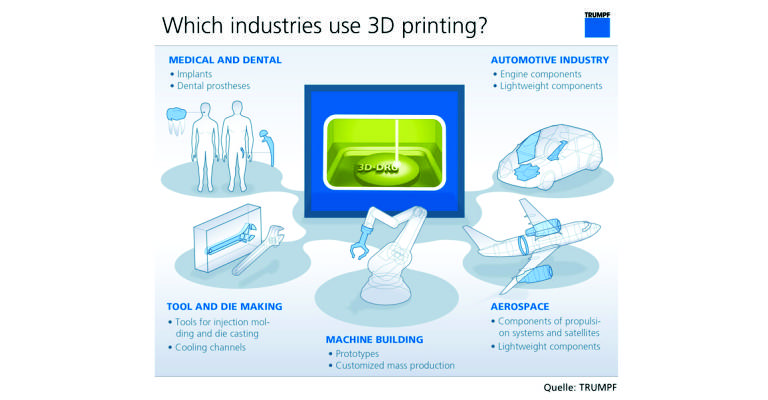TRUMPF has taken the opportunity of its INTECH in-house trade show to present artificial intelligence (AI) solutions for the mechanical engineering industry for the very first time. As a leading provider of Industry 4.0 solutions, the high-tech company is developing AI applications for its own production facilities as well as products for customers. “Artificial intelligence is helping us derive new benefits for manufacturing from the data generated by our machines. AI is boosting competitiveness by increasing the output of connected manufacturing systems,” said Mathias Kammüller, Chief Digital Officer at TRUMPF, at an INTECH press conference. The company is deploying AI in a number of areas, including quality assurance processes in the production of flatbed laser machines.
Laser diodes and 3D printing open up new business opportunities
TRUMPF is expanding its range of products to tap into new market segments in the digital arena. The laser diode business acquired from Philips, for example, has boosted its access to fast-growing markets. Laser diodes are used in smartphones, digital data transfer applications and sensors for autonomous driving.
In addition to its solutions for connected industry, TRUMPF also presented 3D printing systems at its INTECH show. These are becoming increasingly popular in the dental and medical device sectors as well as in the tool and die making, aerospace and mechanical engineering industries. “Additive manufacturing techniques pave the way for more innovative production processes. They are almost unparalleled in their ability to manufacture complex shapes and small batches,” said Peter Leibinger, Chief Technology Officer at TRUMPF. The company recently demonstrated how a ‘green laser’ could be used in the future to print materials such as pure copper and other precious metals.
Rising cost pressure and international competition
“Our customers are facing rising cost pressures, increasing demand for smaller batch sizes and an upsurge in rush jobs. The use of digital and innovative manufacturing technologies and methods is fast emerging as a key criterion for determining whether companies can retain their competitive edge in the future in high-wage Europe,” said Leibinger. He emphasized the importance of continuing to pay close attention to increasing international competition, noting that US society was likely to be more open to new technologies and that China would be pushing ahead vigorously with AI technology. “If Europe is to maintain its role as an industrial leader, it is more important than ever for governments to work together across borders. We need to intensify our collaboration in the Single Market and build on our strengths – by creating the necessary infrastructure for digital business models and promoting research and innovation – otherwise we will fall behind China and the US,” Leibinger warned.
Leading user of connected manufacturing
TRUMPF is driving forward digital transformation on an international level at its own plants and among its employees. “We can harness digitalization to reduce lead times in our factories, boost productivity and reduce inventory levels. The benefits for our customers include faster job processing and simpler ordering processes,” said Kammüller. All TRUMPF managers are currently participating in a training program to prepare them even more thoroughly for digital transformation. “The time has come to seize the opportunities offered by digitalization and new manufacturing technologies. It’s not just big German companies, but also small and medium-sized ones that need to be asking themselves whether they are ready for the digitally connected future. If the answer is no, they need to embark on that process of transformation today,” said Kammüller. He noted that digitalization can be started at any point in time and is equally accessible to SMEs.


